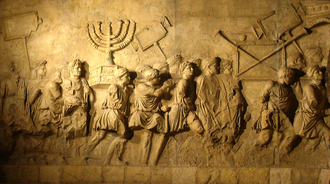Remember, you're not the first people to read the bible. There's twenty centuries of people praying and thinking through scripture and passing on their wisdom. It would be wonderful if we could recover a really lively and positive sense of what tradition meant. Not this great weight pressing down on you---this is how we've always done it---but there's this great reservoir of experience and wisdom which we're free to draw on and grow with.That got me to thinking about the nature of tradition. On the one hand, it can and does form a solid foundation upon which to build. On the other hand, it can just as easily become the proverbial Rock of Sisyphus that folks get tired of moving.
And I think that is one lesson that all new kinds of congregation[s] have to bear in mind. The more traditional, traditionally mainstream kinds of church, need to know that the church is always being restored and renewed from unexpected places. The new, renewing, bits of church need to remember that God has not abandoned His church over twenty centuries and has been giving gifts all the way through to learn from. So it's that balance, what I once called the "mixed economy" of the church, which I think keeps us fit.
I think this has a lot to do with an emerging (no pun intended) idea that this post-Christian time period is much like the time after the destruction of the temple in Jerusalem in 70 A.D. We're in a post-establishment time and there is a huge temptation to metaphorically attempt to carry some of the foundation stones away from the now-destroyed temple in an attempt at reconstruction, or at least an attempt to hold onto a symbol of the way things used to be. Contrast that with Jesus' words about the temple that were read two Sundays ago:
Jesus answered them, "Destroy this temple, and in three days I will raise it up." The Jews then said, "This temple has been under construction for forty-six years, and will you raise it up in three days?" But he was speaking of the temple of his body." (John 2:18-21)Jesus also famously said to his disciples, upon sending them out for the first time:
"You may take along a walking stick. But don't carry food or a traveling bag or any money. It's all right to wear sandals, but don't take along a change of clothes. When you are welcomed into a home, stay there until you leave that town. If any place won't welcome you or listen to your message, leave and shake the dust from your feet as a warning to them." (Mark 6:8b-11)I'm just beginning to unpack the metaphor of the similarities between post-temple Judaism and post-Christendom Christianity, but the lesson for us may be to be quite careful about what we choose to put in our "tradition packs." When I was a child, our family used to take backpacking trips regularly. When one backpacks, the object is to make things as light as possible, since you are going to be carrying anything you pack for many miles. So, things are re-packaged to minimize weight, one makes use of freeze-dried foods that are much lighter than regular food, and one is very careful about what sort of "extras" one takes--and things that seem critical in regular camping, not to mention around the house, rapidly become "extras" when one is forced to carry them for many miles on one's back!
Perhaps that is what we're doing these days in the church--we're packing for an ecclesiastical backpacking trip. We're trying to sort our the essentials from the extras--and sometimes finding out that things that seemed essential when we were in the comforts of Christendom have become extras now that we are packing for a trip into the ecclesiastical and spiritual wilderness. Perhaps we also need to unload and drop our temple building-stones and recall that Jesus is talking about himself when he says:
"Then what do the Scriptures mean when they say, `The stone that the builders tossed aside is now the most important stone of all'? Anyone who stumbles over this stone will get hurt, and anyone it falls on will be smashed to pieces." (Luke 20:17b-18)Pack carefully....
